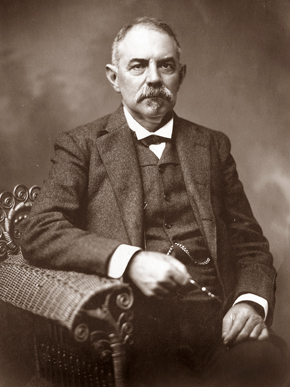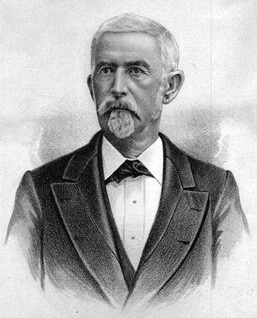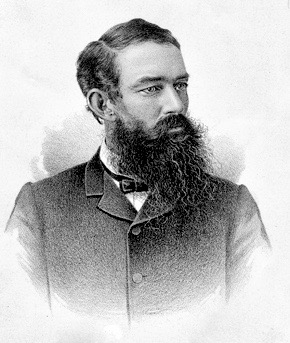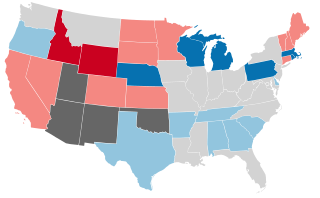
Pickens County is a county located on the west central border of the U.S. state of Alabama. As of the 2020 census, the population was 19,123. Its county seat is Carrollton, located in the center of the county. It is a prohibition, or dry county, although the communities of Carrollton and Aliceville voted to become wet in 2011 and 2012, respectively.

George Corley Wallace Jr. was the 45th governor of Alabama, serving from 1963 to 1967, again from 1971 to 1979, and finally from 1983 to 1987. He is remembered for his staunch segregationist and populist views; however, in the late 1970s, Wallace moderated his views on race, renouncing his support for segregation. During Wallace's tenure as governor of Alabama, he promoted "industrial development, low taxes, and trade schools." Wallace unsuccessfully sought the United States presidency as a Democratic Party candidate three times, and once as an American Independent Party candidate, carrying five states in the 1968 election. Wallace opposed desegregation and supported the policies of "Jim Crow" during the Civil Rights Movement, declaring in his infamous 1963 inaugural address that he stood for "segregation now, segregation tomorrow, segregation forever".

Benjamin Meek Miller was an American Democratic politician who served as the 39th Governor of Alabama from 1931 to 1935.

Joseph Forney Johnston was an American Democratic politician and businessman who was the 30th governor of Alabama from 1896 to 1900. He later served in the United States Senate from August 6, 1907, to his death on August 8, 1913. As a senator, he was chair of the U.S. Senate Committee to Establish a University of the United States.

Thomas Goode Jones was an Alabama lawyer, politician, and military officer. He served in the Alabama legislature and as Governor of Alabama. He later became United States district judge of the United States District Court for the Middle District of Alabama and the United States District Court for the Northern District of Alabama.

Edward Asbury O'Neal was a Confederate officer during the American Civil War and the 26th Governor of Alabama.

Thomas J. Seay was an American Democratic politician who was the 27th Governor of Alabama from 1886 to 1890.

James Milton Smith was a Confederate infantry colonel in the American Civil War, as well as a post-war Governor of Georgia.

The lieutenant governor of Alabama is the president of the Alabama Senate, elected to serve a four-year term. The office was created in 1868, abolished in 1875, and recreated in 1901. According to the current constitution, should the governor be out of the state for more than 20 days, the lieutenant governor becomes acting governor, and if the governor dies, resigns or is removed from office, the lieutenant governor ascends to the governorship. Earlier constitutions said the powers of the governor devolved upon the successor, rather than them necessarily becoming governor, but the official listing includes these as full governors. The governor and lieutenant governor are not elected on the same ticket.

William Columbus Davis was the 11th Lieutenant Governor of Alabama from 1927 to 1931. A Democrat, Davis served Governor Bibb Graves of the same political party.

Kay Ellen Ivey is an American politician who is the 54th governor of Alabama, serving since 2017. Originally a conservative Southern Democrat, Ivey became a member of the Republican Party in 2002. She was the 38th Alabama state treasurer from 2003 to 2011 and the 30th lieutenant governor of Alabama from 2011 to 2017.

The 2018 Alabama gubernatorial election took place on November 6, 2018, to elect the governor of Alabama. Incumbent Governor Kay Ivey (R), who took office on April 10, 2017 upon the resignation of Robert Bentley (R), ran for election to a full term and won over Tuscaloosa mayor Walt Maddox. Ivey was sworn in for her first full term on January 14, 2019. This was the first time since 1966 that a woman was elected governor of Alabama.

The 1892 Alabama gubernatorial election took place on August 1, 1892, in order to elect the governor of Alabama.

The 2022 Alabama gubernatorial election took place on November 8, 2022, to elect the governor of Alabama. Incumbent Governor Kay Ivey took office on April 10, 2017, upon the resignation of Robert J. Bentley (R) and won a full term in 2018. In 2022, she won her bid for a second full term in a landslide.

United States gubernatorial elections were held in 1890, in 27 states, concurrent with the House and Senate elections, on November 4, 1890.

United States gubernatorial elections were held in 1888, in 26 states, concurrent with the House, Senate elections and presidential election, on November 6, 1888.

The 2022 Alabama lieutenant gubernatorial election was held on November 8, 2022, to elect the lieutenant governor of the state of Alabama. The election coincided with various other federal and state elections, including for Governor of Alabama. Primary elections were held on May 24, with runoffs scheduled for June 21 if a candidate failed to receive a majority of the vote.

James Henry Jones was an American politician and lawyer. He served in both houses of the Mississippi Legislature and was the Lieutenant Governor of Mississippi from 1896 to 1900. He also was an officer in the Confederate States Army during the American Civil War.




















